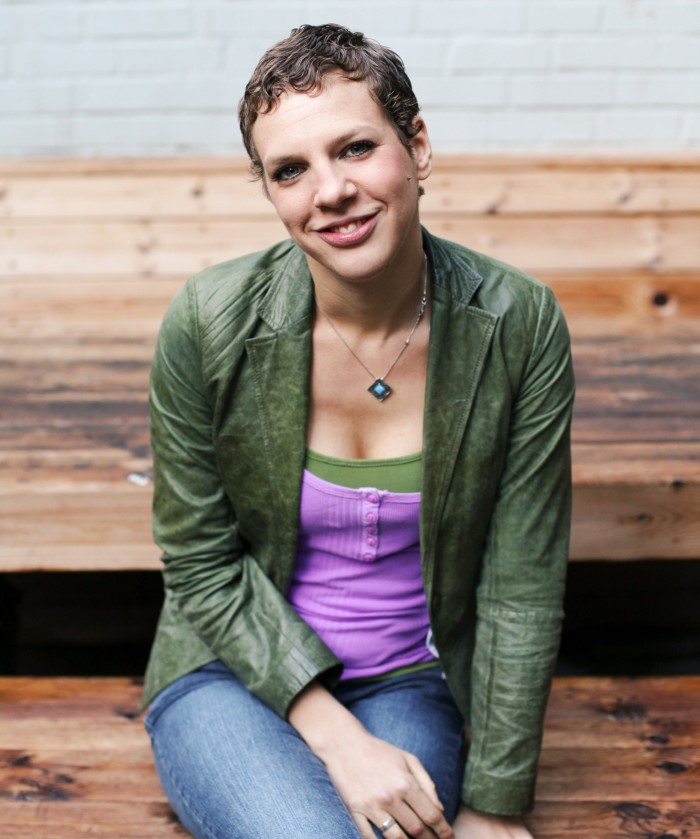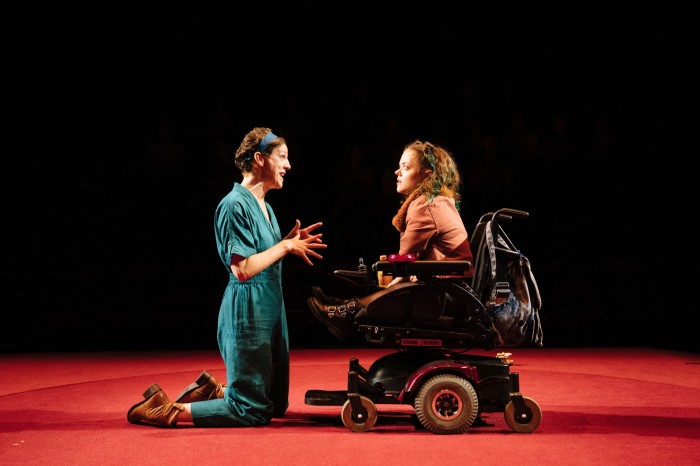Francesca Martinez: wobbliness is a way of ‘normal’ life

Roula Khalaf, Editor of the FT, selects her favourite stories in this weekly newsletter.
I’ve never been a fan of labels, of anything that reduces a human being to a word or phrase. As a young child, I remember hearing my doctor solemnly declare that I had “cerebral palsy”; I took an instant dislike to those ugly words. Being wobbly was just one aspect of my daily — “normal” — life, and not something undesirable.
The way that medical folk spoke about me sounded negative and acutely alienating. I’d never felt wrong or faulty, quite the opposite. I’d felt happy and confident and loved by my parents — and my two Spanish grandparents, who showered me with affection and delicious food. It was quite the shock to discover, early on, that the world around me saw my wobbliness as a sign that I was, in some fundamental way, broken.
I was perplexed by such a silly reaction from so-called grown-ups: why did they define me by my movements rather than who I was inside? My young brain sprang into action and I decided that humour was the appropriate response to this unpleasant reality, as I’d seen how it could magically transform nerves and pity into acceptance and respect. Being funny was my way of making the world look past my wobbles and shakes — and see me instead. It worked.
By the time I became a working comedian, I had a ton of life experience making people laugh. So, when I wobbled on stage to perform stand-up for the first time in a scruffy upstairs room of a pub in Soho in July 1999, I felt something beautiful pulsate inside me (besides the nerves that resulted in visible shakes and twitches). I felt a deep sense of arriving home.
That summer, I fell in love with comedy and its capacity to connect strangers and float alternative ways of looking at ourselves and the world.
Rather than slowly changing preconceptions through one interaction at a time, I felt I could challenge people on a mass scale — hundreds or thousands at once. It was exhilarating and empowering to harness the wonders of stand-up to humanise scary labels, help people relax around difference, and make them realise that wobbly people are just — drum roll — people (and all without being worthy, boring or earnest). What a high!
Addictions come in many forms and I definitely succumbed to the mesmerising lure of a solitary microphone, an empty stage, and an audience full of anticipation.

It’s true that the stand-up profession was dominated by white able-bodied males but that wasn’t really an issue for me, because I was used to being an outsider. It didn’t bother me when I was the only (wobbly) woman on the bill. Nowadays, there is more diversity in stand-up, including some brilliant wobbly comedians but, back then, I was a bit of novelty.
This didn’t pose a problem as, at that stage in my life, I’d grown comfortable with standing out. After a painful stint at high school — mercifully interrupted by getting a part on [BBC television’s children’s series] Grange Hill — and the following years of self-loathing and anxiety, I had hit a point where I had a stark choice: to accept myself or live in misery.
Thankfully, I made the right choice, and learned to love my wobbly body. It had given me life after all, and I was determined not to waste a single day more comparing myself to the toxic fiction of normality that was routinely sold to us. I was perfectly Francesca and I was grateful to be alive.
More stories from this report
Embracing myself reconnected me to the joys of life, and I began to reconsider how I viewed my wobbliness. It was always implied that I’d have to succeed “in spite of it”, but I began to feel strongly that the opposite was true. I realised that it had made me more patient, more empathetic, more determined, and more tenacious — and these were all positive qualities that had been instrumental in my career.
I had learnt to reach a high level of consistency in my performances, precisely because I wouldn’t get any “second chances”. Knowing that I would not be booked again if I “died” on stage felt like an unfair pressure but, on reflection, I can see that it spurred me on to develop a strong work ethic. My family bonds had been deepened by my physical dependence, and my brother was my best friend — something that I cherish to this day.
Seeing the positive ways in which being wobbly has shaped me, and my life, has made me look at our personal challenges differently.
Far from being what hinders us, our “imperfections” or “shortcomings” are actually great opportunities for growth, for deeper understanding, for cultivating inner peace. I don’t think I would have questioned the unhealthy pressures to conform at such an early age had I not been wobbly.
Looking back, any suffering I’ve encountered in my life has not come from being wobbly but from living in a world that breeds self-loathing. I believe that self-acceptance and happiness for anyone come from questioning dominant narratives which don’t serve our wellbeing, and adopting healthier values. It’s cheaper than buying stuff — which is consumer culture’s answer to everything — and has the added benefit of saving resources on a finite planet!
Being wobbly has brought challenges and joys into my life, but surely the same can be said for everybody’s set of circumstances. Yes, I’ve faced discrimination and have lost certain jobs due to it, but I’ve gained much of value and been offered other jobs partly because of my difference. I believe challenges are universal and part of life.
Some people are physically wobbly; others are emotionally wobbly. Diversity is a word that applies to all of us. We are all different. Making sure that diversity is represented in all aspects of life shouldn’t be a box-ticking exercise: it is simply an attempt to reflect life as it is.
While we all differ in unique ways, the best things in life — love, friendship, community, progress — emerge when we transcend those differences and connect with each other as people.
Francesca Martinez recently starred in her own play All of Us at the National Theatre in London. Her book What the **** is Normal?! is published by Penguin
Comments